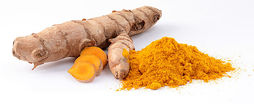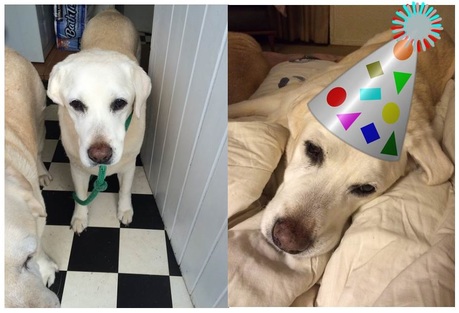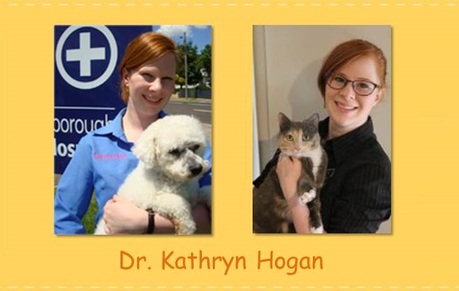
This month we celebrate a 17th birthday (Go Calvin!), we chat to the lovely Vet Dr Kathryn Hogan and we make a super-healthy dog friendly turmeric recipe for the colder months of the year!

DOG OF THE MONTH
Lucas is a young boy at only 20 months old who loves swimming and going for walks. He is very happy to play with other dogs but is a little cautious on first introductions. Since being in care, he's really benefited by being around an older, calmer dog. Lucas would really like to find a home where he's not on his own too often and his owners are committed to ensuring he feels safe and secure. He would be best suited to a home where he will be able to completely relax, knowing that he's loved and cherished.
Lucas is a young boy at only 20 months old who loves swimming and going for walks. He is very happy to play with other dogs but is a little cautious on first introductions. Since being in care, he's really benefited by being around an older, calmer dog. Lucas would really like to find a home where he's not on his own too often and his owners are committed to ensuring he feels safe and secure. He would be best suited to a home where he will be able to completely relax, knowing that he's loved and cherished.

BUY A BIRTHDAY IN THE 2017 CALENDAR for $10!
The Labrador Rescue Calendar is one of our most popular products, featuring gorgeous photos of Labradors both fostered and adopted. This is an opportunity to have your dogs name in our 2017 Calendar. For $10, the name of your dog will feature on their birthday square! Get 2 for $15 or 3 for $20! Get in quick, must end July 17th!
The Labrador Rescue Calendar is one of our most popular products, featuring gorgeous photos of Labradors both fostered and adopted. This is an opportunity to have your dogs name in our 2017 Calendar. For $10, the name of your dog will feature on their birthday square! Get 2 for $15 or 3 for $20! Get in quick, must end July 17th!
HAPPY ENDINGS
Happy 17th Birthday Calvin! (119th Birthday in Dog Years!!)
Calvin was adopted from Labrador Rescue in 2010 at the age of 11. He has a few age-related issues – a bit of arthritis, he can’t see too well at night, and he has the early signs of Alzheimer’s. However Calvin doesn’t let those things hold him back; he still likes to get up bright and early every morning for breakfast, followed by a leisurely stroll – usually while holding his own leash!
May there be many more happy adventures for our birthday boy Calvin!
Happy 17th Birthday Calvin! (119th Birthday in Dog Years!!)
Calvin was adopted from Labrador Rescue in 2010 at the age of 11. He has a few age-related issues – a bit of arthritis, he can’t see too well at night, and he has the early signs of Alzheimer’s. However Calvin doesn’t let those things hold him back; he still likes to get up bright and early every morning for breakfast, followed by a leisurely stroll – usually while holding his own leash!
May there be many more happy adventures for our birthday boy Calvin!
MEET THE EXPERT
Name: Dr Kathryn Hogan
Title: BVSc MVS MANZCVS (Small Animal Medicine)
Practice: Greencross Caulfield South, Vic
Length of years in the industry: 6 years
How did you know you wanted to be a vet?
I can't remember a time that I didn't want to be a vet! I went to the University of Melbourne veterinary open day every year from grade 6 until I was accepted into the course. Like many in our industry I've had a passion for animal care since I was a young child that stemmed from my experiences with my own pets. My pets have always been much loved family members and improving (and prolonging) the human-animal bond we have with our pets has been one of the major drivers for me to follow the path of becoming a vet.
What's your most common pet owner mistake you see?
The most common mistake I see pet owners make is waiting to see if something will improve, often for days or weeks, meaning that treatment is delayed to the detriment of the patient. Many diseases can be well managed if corrected early and intervention started before they become severe. Waiting days to see if there is any change can mean a pet being painful or uncomfortable during this time and management from there can often be more expensive than if we had started treatment earlier. You know your pet best - if you're concerned they're unwell, organise an appointment with your vet to have them checked over. I'd rather tell you your pet is healthy or only has a mild problem, than have to tell you we could have fixed the issue days ago but it will require more intensive management now.
What's your favourite part of your job?
Sending a patient home after they've been in hospital. Seeing them wag their tails and run to the owners once they are happy and well again makes all the hard work that goes on behind the scenes to get them to that point worthwhile.
What's your best piece of advice for Labrador health?
1. Don't leave ANY food out unattended!
2. Find a vet that you trust and enjoy working with.
3. Pet insurance! From the accidental ingestion of a sock/harness/rock/squeaky toy/fish hook that requires surgery to remove (yes, I've seen Labs that have eaten the above!), or the development of hip or elbow dysplasia that needs long term arthritis management, with a Labrador you'll probably visit the vet at some point for something other than vaccinations. Having a good pet insurance that will cover them for their entire life, relieves some of the financial pressures associated with making important decisions regarding your dog's health. As with any insurance - always read the fine print first though!
Name: Dr Kathryn Hogan
Title: BVSc MVS MANZCVS (Small Animal Medicine)
Practice: Greencross Caulfield South, Vic
Length of years in the industry: 6 years
How did you know you wanted to be a vet?
I can't remember a time that I didn't want to be a vet! I went to the University of Melbourne veterinary open day every year from grade 6 until I was accepted into the course. Like many in our industry I've had a passion for animal care since I was a young child that stemmed from my experiences with my own pets. My pets have always been much loved family members and improving (and prolonging) the human-animal bond we have with our pets has been one of the major drivers for me to follow the path of becoming a vet.
What's your most common pet owner mistake you see?
The most common mistake I see pet owners make is waiting to see if something will improve, often for days or weeks, meaning that treatment is delayed to the detriment of the patient. Many diseases can be well managed if corrected early and intervention started before they become severe. Waiting days to see if there is any change can mean a pet being painful or uncomfortable during this time and management from there can often be more expensive than if we had started treatment earlier. You know your pet best - if you're concerned they're unwell, organise an appointment with your vet to have them checked over. I'd rather tell you your pet is healthy or only has a mild problem, than have to tell you we could have fixed the issue days ago but it will require more intensive management now.
What's your favourite part of your job?
Sending a patient home after they've been in hospital. Seeing them wag their tails and run to the owners once they are happy and well again makes all the hard work that goes on behind the scenes to get them to that point worthwhile.
What's your best piece of advice for Labrador health?
1. Don't leave ANY food out unattended!
2. Find a vet that you trust and enjoy working with.
3. Pet insurance! From the accidental ingestion of a sock/harness/rock/squeaky toy/fish hook that requires surgery to remove (yes, I've seen Labs that have eaten the above!), or the development of hip or elbow dysplasia that needs long term arthritis management, with a Labrador you'll probably visit the vet at some point for something other than vaccinations. Having a good pet insurance that will cover them for their entire life, relieves some of the financial pressures associated with making important decisions regarding your dog's health. As with any insurance - always read the fine print first though!

CANINE HEALTH
Did you know that dogs can benefit substantially from adding turmeric to their daily diet? Turmeric Powder, the vibrant yellow spice, is known to many as a natural wonder. Dogs can experience a significant reduction in inflammation, particularly with respect to arthritis, itchy skin, irritable bowel disease and general improvement in health.
Mixing Turmeric with black pepper and either coconut, linseed or olive oil makes it more bio available. Turmeric has blood thinning properties, so it’s advisable to check with a Vet for those animals already on medication.
Here is a recipe for simple Turmeric paste, which can be kept in the fridge for up to 2 weeks and added in small amounts to dog’s meals or mixed up with natural yogurt for a treat.
½ cup organic turmeric powder (Make sure it’s organic turmeric powder to be sure it contains lots of curcumin)
1 to 1 ½ cups filtered water
1 ½ teaspoons freshly ground black pepper (Grind organic black peppercorns in a coffee grinder or magic bullet)
¼ cup organic cold pressed virgin olive or coconut oil (Coconut oil is a great choice because it also has great health benefits)
Mix the turmeric with water in a pan, starting with 1 cup water and adding more only if needed. Stir the liquid on medium/low heat and in about 7 to 10 minutes, it should form a thick paste.Once you’ve got a paste, add the pepper and oil, then stir it very well. Store cooled mixture in a fridge.
Did you know that dogs can benefit substantially from adding turmeric to their daily diet? Turmeric Powder, the vibrant yellow spice, is known to many as a natural wonder. Dogs can experience a significant reduction in inflammation, particularly with respect to arthritis, itchy skin, irritable bowel disease and general improvement in health.
Mixing Turmeric with black pepper and either coconut, linseed or olive oil makes it more bio available. Turmeric has blood thinning properties, so it’s advisable to check with a Vet for those animals already on medication.
Here is a recipe for simple Turmeric paste, which can be kept in the fridge for up to 2 weeks and added in small amounts to dog’s meals or mixed up with natural yogurt for a treat.
½ cup organic turmeric powder (Make sure it’s organic turmeric powder to be sure it contains lots of curcumin)
1 to 1 ½ cups filtered water
1 ½ teaspoons freshly ground black pepper (Grind organic black peppercorns in a coffee grinder or magic bullet)
¼ cup organic cold pressed virgin olive or coconut oil (Coconut oil is a great choice because it also has great health benefits)
Mix the turmeric with water in a pan, starting with 1 cup water and adding more only if needed. Stir the liquid on medium/low heat and in about 7 to 10 minutes, it should form a thick paste.Once you’ve got a paste, add the pepper and oil, then stir it very well. Store cooled mixture in a fridge.



 RSS Feed
RSS Feed
